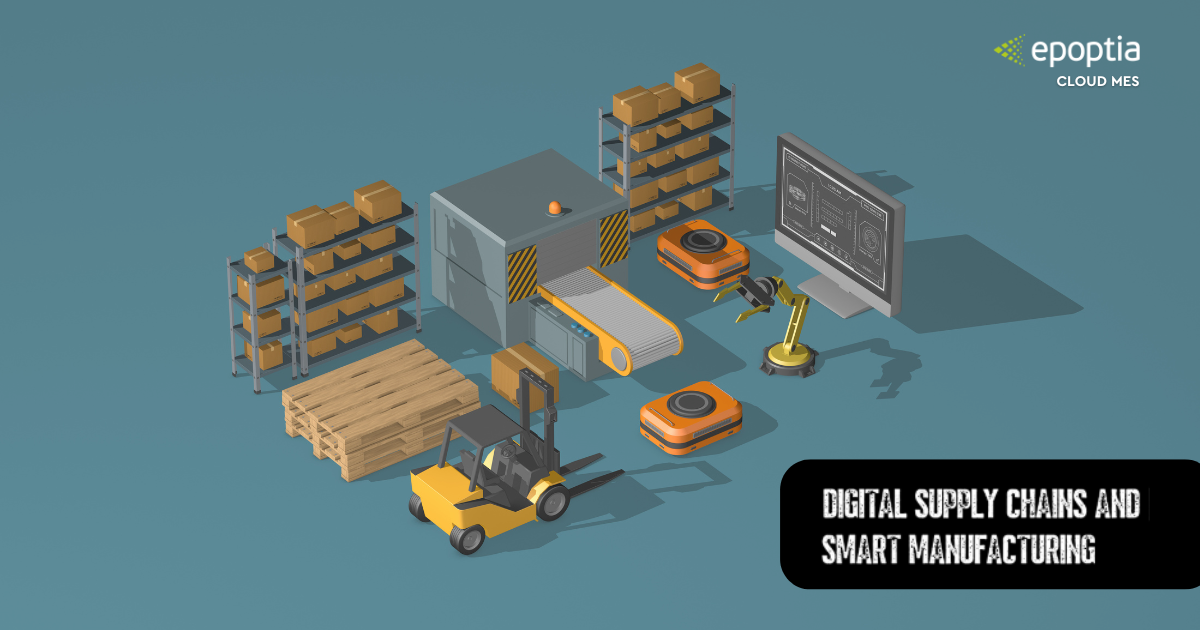Ανακαλύψτε τη δύναμη των ψηφιακών αλυσίδων εφοδιασμού και της έξυπνης παραγωγής. Μάθετε πώς αυτές οι τεχνολογίες μπορούν να βελτιώσουν την αποδοτικότητα, να ενισχύσουν την ορατότητα και να επιλύσουν κοινές κατασκευαστικές προκλήσεις.
Κατ' αρχάς, η μεταποιητική βιομηχανία υφίσταται μια σεισμική αλλαγή καθώς αγκαλιάζει την ψηφιακή εποχή. Οι ψηφιακές αλυσίδες εφοδιασμού και η έξυπνη κατασκευή δεν είναι πλέον μόνο λέξεις- αντιπροσωπεύουν έναν απαραίτητο μετασχηματισμό που επιτρέπει στους κατασκευαστές να παραμείνουν ανταγωνιστικοί, ευέλικτοι και ανθεκτικοί σε μια ταχέως εξελισσόμενη αγορά. Με την αξιοποίηση τεχνολογιών όπως το IoT (Internet of Things), η AI (Τεχνητή Νοημοσύνη), η προηγμένη ανάλυση και η υπολογιστική νέφους, οι κατασκευαστές όχι μόνο ενισχύουν τη λειτουργική αποδοτικότητα αλλά και βελτιώνουν την ορατότητα της εφοδιαστικής αλυσίδας και την ικανοποίηση των πελατών.
Σε αυτό το άρθρο, θα διερευνήσουμε τι συνεπάγονται οι ψηφιακές αλυσίδες εφοδιασμού και η έξυπνη κατασκευή, τα οφέλη τους και τις κοινές προκλήσεις που επιλύουν. Επιπλέον, θα επισημάνουμε τον τρόπο με τον οποίο οι κατασκευαστές μπορούν να λάβουν εφαρμόσιμα μέτρα για την υιοθέτηση αυτών των μετασχηματιστικών πρακτικών.
Τι είναι η ψηφιακή αλυσίδα εφοδιασμού;
Μια ψηφιακή αλυσίδα εφοδιασμού χρησιμοποιεί την τεχνολογία για την ενσωμάτωση και τη βελτιστοποίηση κάθε πτυχής της διαχείρισης της αλυσίδας εφοδιασμού, από την προμήθεια και την παραγωγή έως τη διανομή και την εξυπηρέτηση πελατών. Σε αντίθεση με τις παραδοσιακές αλυσίδες εφοδιασμού που βασίζονται σε μεγάλο βαθμό σε χειροκίνητες διαδικασίες, οι ψηφιακές αλυσίδες εφοδιασμού είναι δυναμικά, διασυνδεδεμένα συστήματα που τροφοδοτούνται από δεδομένα.
Βασικά χαρακτηριστικά των ψηφιακών αλυσίδων εφοδιασμού:
1. Ανταλλαγή και ανάλυση δεδομένων σε πραγματικό χρόνο
2. Προβλεπτικές και προδιαγραφικές γνώσεις με χρήση AI και μηχανικής μάθησης
3. Ενσωμάτωση του IoT για τον εντοπισμό και την παρακολούθηση περιουσιακών στοιχείων
4. Αυτοματοποίηση επαναλαμβανόμενων εργασιών, όπως η διαχείριση αποθεμάτων
5. Ενισχυμένη συνεργασία μεταξύ προμηθευτών, κατασκευαστών και πελατών
Συνολικά, με τη μετάβαση σε μια ψηφιακή αλυσίδα εφοδιασμού, οι κατασκευαστές μπορούν να επιτύχουν μεγαλύτερη διαφάνεια, ευελιξία και αποτελεσματικότητα στις δραστηριότητές τους.
Τι είναι το Smart Manufacturing?
Επιπλέον, η έξυπνη κατασκευή αναφέρεται στη χρήση διασυνδεδεμένων τεχνολογιών και συστημάτων με βάση τα δεδομένα για τη βελτίωση των διαδικασιών παραγωγής. Ενσωματώνει προηγμένους αυτοματισμούς, συσκευές με δυνατότητα IoT και μηχανική μάθηση για τη δημιουργία ευέλικτων και αποδοτικών περιβαλλόντων παραγωγής.
Βασικές τεχνολογίες πίσω από την έξυπνη κατασκευή:
Αισθητήρες IoT: Συλλέξτε δεδομένα από μηχανήματα, προϊόντα και διαδικασίες σε πραγματικό χρόνο.
Τεχνητή νοημοσύνη και μηχανική μάθηση: Αναλύστε δεδομένα για τον εντοπισμό μοτίβων, τη βελτιστοποίηση ροών εργασίας και τη λήψη προγνωστικών αποφάσεων.
Υπολογιστικό νέφος: Παροχή κλιμακούμενης αποθήκευσης και υπολογιστικής ισχύος για την επεξεργασία δεδομένων.
Ρομποτική και αυτοματισμοί: Εξορθολογισμός των χειροκίνητων εργασιών και μείωση του ανθρώπινου σφάλματος.
Ψηφιακά δίδυμα: Δημιουργία εικονικών αντιγράφων φυσικών συστημάτων για προσομοιώσεις και δοκιμές.
Εν ολίγοις, η έξυπνη κατασκευή επιτρέπει τόσο στα εργοστάσια όσο και στους κατασκευαστές μεγάλης κλίμακας να λειτουργούν πιο αποτελεσματικά, να ελαχιστοποιούν τα απόβλητα και να ανταποκρίνονται γρήγορα στις αλλαγές της ζήτησης.
Οφέλη των ψηφιακών αλυσίδων εφοδιασμού και της έξυπνης παραγωγής
Προχωρώντας, τόσο οι ψηφιακές αλυσίδες εφοδιασμού όσο και η έξυπνη κατασκευή ξεκλειδώνουν μια σειρά από οφέλη για τους κατασκευαστές. Αυτά περιλαμβάνουν:
1. Βελτιωμένη ορατότητα και ιχνηλασιμότητα
Μία από τις βασικές προκλήσεις στις παραδοσιακές αλυσίδες εφοδιασμού είναι η έλλειψη ορατότητας όσον αφορά τα αποθέματα, τις αποστολές και την κατάσταση της παραγωγής. Δηλαδή, οι ψηφιακές αλυσίδες εφοδιασμού προσφέρουν παρακολούθηση σε πραγματικό χρόνο, επιτρέποντας στους κατασκευαστές να παρακολουθούν κάθε στάδιο της διαδικασίας. Για παράδειγμα, οι συσκευές IoT μπορούν να παρακολουθούν τις πρώτες ύλες από τον προμηθευτή έως την παραγωγή, εξασφαλίζοντας την έγ��αιρη παράδοση και τον έλεγχο της ποιότητας.
2. Ενισχυμένη ευελιξία
Επιπλέον, οι απαιτήσεις της αγοράς μπορούν να αλλάξουν εν ριπή οφθαλμού. Οι ψηφιακές αλυσίδες εφοδιασμού παρέχουν την ευελιξία να προσαρμόζονται γρήγορα στις διακυμάνσεις της ζήτησης ή στις διαταραχές, όπως οι ελλείψεις εφοδιασμού ή οι φυσικές καταστροφές. Η προγνωστική ανάλυση μπορεί να προβλέψει πιθανές συμφορήσεις και να προτείνει εναλλακτικές λύσεις, διατηρώντας την ομαλή λειτουργία των επιχειρήσεων.
3. Βελτιστοποιημένη κατανομή πόρων
Επιπλέον, τα έξυπνα συστήματα παραγωγής χρησιμοποιούν γνώσεις που βασίζονται στην τεχνητή νοημοσύνη για τη βελτιστοποίηση της κατανομής των πόρων, όπως τα υλικά, η εργασία και η ενέργεια. Αυτό μειώνει τα απόβλητα και διασφαλίζει ότι η παραγωγή είναι όσο το δυνατόν πιο αποδοτική.
4. Εξοικονόμηση κόστους
Με την αυτοματοποίηση των χειροκίνητων διαδικασιών και τον εντοπισμό αναποτελεσματικότητας, οι κατασκευαστές μπορούν να μειώσουν σημαντικά το λειτουργικό κόστος. Για παράδειγμα, η προληπτική συντήρηση που τροφοδοτείται από αισθητήρες IoT μπορεί να αποτρέψει δαπανηρές βλάβες του εξοπλισμού με τον εντοπισμό προβλημάτων πριν αυτά κλιμακωθούν.
5. Λειτουργίες με επίκεντρο τον πελάτη
Επίσης, οι ψηφιακές αλυσίδες εφοδιασμού επιτρέπουν στους κατασκευαστές να ανταποκρίνονται αποτελεσματικότερα στις ανάγκες των πελατών. Για παράδειγμα, η προηγμένη παρακολούθηση παραγγελιών και οι εξατομικευμένες προτάσεις προϊόντων δημιουργούν καλύτερη εμπειρία για τους πελάτες.
Προκλήσεις που επιλύονται από τις ψηφιακές αλυσίδες εφοδιασμού και την έξυπνη παραγωγή
Λαμβάνοντας όλα υπόψη, η υιοθέτηση αυτών των τεχνολογιών είναι ιδιαίτερα αποτελεσματική για την αντιμετώπιση μακροχρόνιων προκλήσεων στη μεταποιητική βιομηχανία:
1. Διαταραχές στην αλυσίδα εφοδιασμού
Παγκόσμια γεγονότα όπως οι πανδημίες και οι γεωπολιτικές εντάσεις έχουν υπογραμμίσει την ευπάθεια των παραδοσιακών αλυσίδων εφοδιασμού. Οι ψηφιακές αλυσίδες εφοδιασμού μετριάζουν αυτούς τους κινδύνους επιτρέποντας την παρακολούθηση σε πραγματικό χρόνο, τον εντοπισμό εναλλακτικών προμηθευτών και την ταχεία επαναδρομολόγηση των αποστολών.
2. Αναποτελεσματικότητα στην παραγωγή
Οι χειροκίνητες διαδικασίες οδηγούν συχνά σε καθυστερήσεις, σφάλματα και σπατάλη πόρων. Η έξυπνη κατασκευή τις αντικαθιστά με αυτοματοποιημένες, καθοδηγούμενες από δεδομένα ροές εργασίας που εξορθολογίζουν την παραγωγή και βελτιώνουν την ακρίβεια.
3. Έλλειψη λήψης αποφάσεων βάσει δεδομένων
Οι παραδοσιακές αλυσίδες εφοδιασμού και τα εργοστάσια βασίζονται σε ιστορικά δεδομένα και στο ένστικτο. Τα ψηφιακά συστήματα, από την άλλη πλευρά, παρέχουν πληροφορίες σε πραγματικό χρόνο που δίνουν στους κατασκευαστές τη δυνατότητα να λαμβάνουν προληπτικές, τεκμηριωμένες αποφάσεις.
4. Ελλείψεις εργατικού δυναμικού
Ο αυτοματισμός και οι έξυπνες τεχνολογίες καλύπτουν τα κενά που αφήνουν οι ελλείψεις εργατικού δυναμικού, επιτρέποντας στους κατασκευαστές να διατηρούν την παραγωγικότητα χωρίς να βασίζονται σε μεγάλο βαθμό στη χειρωνακτική εργασία.
5. Περιβαλλοντικές ανησυχίες
Η βιωσιμότητα αποτελεί αυξανόμενη προτεραιότητα για τους κατασκευαστές. Μειώνοντας τα απόβλητα και την κατανάλωση ενέργειας, η έξυπνη κατασκευή και οι ψηφιακές αλυσίδες εφοδιασμού βοηθούν τις εταιρείες να επιτύχουν τους περιβαλλοντικούς τους στόχους.
Βήματα για την υιοθέτηση ψηφιακών αλυσίδων εφοδιασμού και έξυπνης παραγωγής
Ενώ η μετάβαση στις ψηφιακές αλυσίδες εφοδιασμού και στην έξυπνη παραγωγή μπορεί να φαίνεται τρομακτική, είναι ένα ταξίδι που αξίζει να αναληφθεί. Δείτε πώς μπορούν να ξεκινήσουν οι κατασκευαστές:
1. Αξιολόγηση των τρεχουσών δυνατοτήτων
Αρχικά, ξεκινήστε με την αξιολόγηση της υφιστάμενης αλυσίδας εφοδιασμού και των διαδικασιών παραγωγής για να εντοπίσετε τις αναποτελεσματικότητες και τους τομείς που χρήζουν βελτίωσης.
2. Επενδύστε στις σωστές τεχνολογίες
Στη συνέχεια, αναζητήστε κλιμακούμενες λύσεις που ευθυγραμμίζονται με τις ανάγκες της επιχείρησής σας. Αυτό θα μπορούσε να περιλαμβάνει αισθητήρες IoT, πλατφόρμες που βασίζονται στο cloud ή εργαλεία ανάλυσης με βάση την τεχνητή νοημοσύνη.
3. Δημιουργία εξειδικευμένου εργατικού δυναμικού
Συνεχίζοντας, εκπαιδεύστε τους υπαλλήλους σας να εργάζονται με τις νέες τεχνολογίες και ενσωματώστε τις απρόσκοπτα στις ροές εργασίας σας. Εναλλακτικά, προσλάβετε ταλέντα με εξειδίκευση στα ψηφιακά συστήματα.
4. Συνεργασία με εταίρους
Επίσης, συνεργαστείτε στενά με τους προμηθευτές, τους διανομείς και τους παρόχους τεχνολογίας για να διασφαλίσετε μια ομαλή μετάβαση.
5. Ξεκινήστε από μικρά
Τέλος, εφαρμόστε ψηφιακές λύσεις σε συγκεκριμένους τομείς των λειτουργιών σας πριν τις επεκτείνετε σε ολόκληρη την αλυσίδα εφοδιασμού ή το εργοστάσιο.
Συμπέρασμα
Συνοψίζοντας, ��αθώς η μεταποιητική βιομηχανία συνεχίζει να εξελίσσεται, η υιοθέτηση ψηφιακών αλυσίδων εφοδιασμού και έξυπνης παραγωγής θα γίνεται όλο και πιο απαραίτητη. Με την υιοθέτηση αυτών των τεχνολογιών, οι κατασκευαστές μπορούν να επιτύχουν απαράμιλλη αποτελεσματικότητα, ευελιξία και ανθεκτικότητα στις δραστηριότητές τους.
EPOPTIA MES, (Manufacturing Execution System) έχει σχεδιαστεί για να δώσει στους κατασκευαστές τα εργαλεία που χρειάζονται για να επιτύχουν στην ψηφιακή εποχή. Από την παρακολούθηση της παραγωγής σε πραγματικό χρόνο έως την προηγμένη ανάλυση και την αυτοματοποίηση της ροής εργασιών, απλοποιεί τις πολύπλοκες διαδικασίες παραγωγής και οδηγεί στη λειτουργική αριστεία.
Αν είστε έτοιμοι να μεταμορφώσετε την επιχείρησή σας, επικοινωνήστε μαζί μας σήμερα για μια εξατομικευμένη παρουσίαση και ανακαλύψτε πώς το Epoptia μπορεί να φέρει επανάσταση στις διαδικασίες παραγωγής σας.
Για περισσότερες πληροφορίες, δείτε https://bit.ly/3vYnb4f.




















